Feeling good: the ecstatic return of Japanese Breakfast
After years of grief, Michelle Zauner is ready to embrace joy again
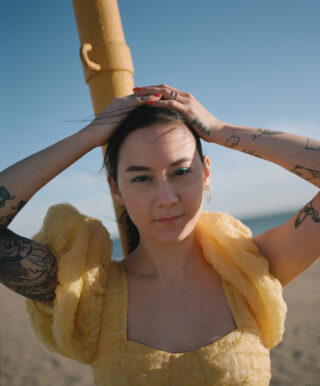
After years of grief, Michelle Zauner is ready to embrace joy again
Japanese Breakfast is on the cover of Loud And Quiet Issue 146. Grab your copy, or become a member to support independent music and journalism, here.
There is a scene in Michelle Zauner’s forthcoming memoir, Crying in H Mart, where she describes an encounter at a karaoke bar in Vietnam. Reeling with grief, having recently nursed her mum through terminal cancer, unmoored from what had formerly constituted reality, Zauner finds herself alone in the bar following an argument with her father. They are on vacation together, their already fractious relationship now fraying utterly without the rod of her mother’s love to shore it up. Taking refuge in the karaoke bar, she meets a young Vietnamese woman whose rendition of ‘My Heart Will Go On’ gives way to a brief yet profound connection that results, obliquely, in Zauner’s peaceful reconciliation with her father. In this scene, as throughout the memoir, Zauner plays with the intricacies of interrelationships and their ripples outward. The book reveals the gossamer strands that tie us to one another, their fine and fragile nature, and how sensory experiences in food, art and music help us express, experience and share joy as we cling on despite the frailty.
It is grief, love and the possibilities of connection in the midst of fragility that I’m thinking about when Zauner and I meet. They are on my mind both for obvious global crisis reasons, and for reasons to do with the personal effects of the crisis, which has seen me mostly alone at home without any sustained human contact for the past several months.
“I think relationships with other people are what make being alive pretty interesting,” Zauner says, when I ask if attention to themes of human connection in her memoir, and in her forthcoming Japanese Breakfast album Jubilee, were intentional, or just what I’ve fabricated as significant given my own circumstances. “I’m interested in the way human beings interact with one another – it’s what I spend most of my time thinking about. I think it’s the most nuanced and complicated part of life. I think the writing that I enjoy is sort of taking a magnifying glass to a small moment and exploring what that means in a relationship or how it impacts a relationship in some way. It’s such a raw question.”
Issues of connection and love are perhaps particularly raw, given not only the pandemic, but that Zauner has been working through grief in her life, writing and music since the loss of her mother in 2014. Her first two albums under the Japanese Breakfast project (2016’s Psychopomp and 2017’s Soft Sounds from Another Planet) dwelled in grief and its aftermath. The attempt to reignite joy that drives her third album, which drops later this month, marks a shift in her attention. Yet, to call the album joyful does not do justice to its complexity. This is a search for joy rather than its expression. She does not pretend that joy is a straightforward emotion, “I think that joy is… I don’t know,” Zauner tells me, “…it’s an inexplicable feeling in some ways. It feels like a maximalist feeling. Just ecstatic contentment. It’s the orgasm of human experience. It’s what everyone is chasing in their lives, to have this peak moment of feeling. And it’s what we as human beings strive for and try to create all the time, when we travel, when we date, when we eat maybe…”
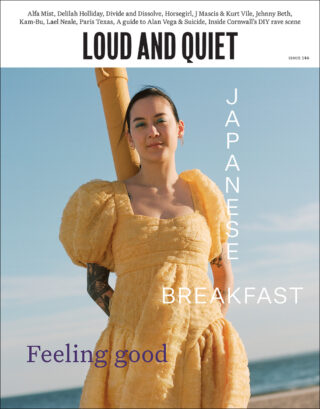
Joy as the orgasm of human experience makes me think of how the French call orgasms ‘little deaths’, the darkness and oblivion mixed in with the pleasure. Of the impossibility of real pleasure without the underside of its opposite. My favourite track on Zauner’s Jubilee, ‘In Hell’ works with joy’s dark complexities. The opening line, (“With my luck you’ll be dead within the year / I’ve come to expect it / There’s nothing left to fear, at least there’s that”), evokes the freedom and the unsettling lightness that come with having experienced the worst, and born it through to the other side. I listen to it over and over again as I prepare for our interview, wondering how we will feel when all this is done, and we can be together again. If that is even possible. How this time of darkness might intensify the pleasure of its relief; how we didn’t know it was vital and sustaining to sit in a pub garden and smoke a cigarette with a friend on a sunny afternoon until that was no longer something that would always be available.
“I think that to have an album about joy has been maybe confusing for some people,” Zauner says. “Because, obviously, I am not going to present an album that is ten tracks of zip-a-dee-doo-dah. So, for me, the album and all the songs on the record are about the ways that people can fight to experience joy, or what we need to do to sustain or preserve joy. And I think every song on the album does that in a way.”
Even ‘In Hell’?
“To be fair, I think ‘In Hell’ is probably the saddest song that I’ve ever written, and it still has grief in it. Which, you know, I can’t ever eliminate from my life. But in some ways I think that I can look at that song and I can look at those moments, and I can still experience joy in my life, even though I’ve hit rock bottom. I think it’s a testament to human nature’s desire to survive, and what I’ve learned from just so much loss and tragedy in my life. It did change me very much, you know? I feel like I live my life more fully now that I recognise how near death feels to me.”
She sighs.
“That song is comparing snowing my mother over with hydrocodone and putting my dog down. Seeing how easy it is to kill something. And one thing that was so hard is that when someone’s sick, you watch in movies and someone just closes their eyes and they’re gone, and that’s just not how it happens. It’s often weeks of a comatose state, and it’s very much at your hands to make sure they don’t experience pain through that process. It’s days and days of suspended mourning. And then when I put my dog down it’s literally a shot. But that first line, I feel like the worst thing in so many ways has already happened to me, and yet I’ve still moved forward. And yet I’ve still been able to experience joy, and I feel like I can experience more joy. I work harder, I feel things more, because I watched someone die and I have a genetic disposition to probably have the same illness. And I feel like I need to really take advantage of my time and say what I need to say and experience the things I want to experience. And I think for a lot of people the pandemic has done that for them as well. A lot of friends I’ve watched kind of reckon with this moment of ‘What do I want to do right now?’, ‘I thought this job was my life and now that I can’t do it, what is there?’ or, ‘I see it in a new perspective, I wanna change.’ I have a lot of friends who moved, or went to the country or broke up with their partner – because this kind of crisis makes you confront what’s really important.”
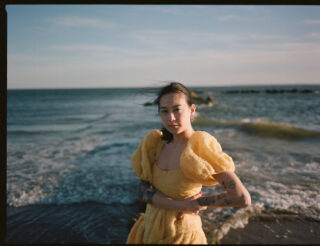
After Zauner lost her mother, she reckoned with what was important in her own life. At 25, having played in bands for almost ten years, she began to think that, if she hadn’t made music a sustaining career yet, that wasn’t going to happen. She needed to settle down and find a job that might finance her life with her husband, and take her somewhere new. Choosing what she presumed was a sensible and maybe even glamorous path, she found a job in New York, moving there from Oregon to work in advertising. It paid decent wages, and Zauner carried on working on creative projects in her spare time. But the corporate environment did not make her happy. “You watch the people eat their lunches at their desks. And it is like… I mean, I’m so grateful for that experience in a way because it made me realise: I can never go back to this. Anything that I do is better than this. And I’d always been curious about it, because if you haven’t done it, it seems glamourous in a weird way. Like sometimes I go to corporate offices and they have mineral water, and they have a gym membership that comes with their benefits or whatever. And that kind of thing is really enticing if you haven’t worked in that world. And then once you’ve worked in that world you’re like, ‘Ok, getting free Equinox gym membership in exchange from what they want from you is actually not worth it.’
“And nine months into the job I started getting press for Psychopomp. I had signed to a small label called Yellow K just to release it. I had told them, ‘I’m not gonna tour. I have this job now. I’ve tried touring. That doesn’t work out – I just wanna press five hundred records and slowly sell them over the course of ten years.’ And they were like, ‘Great we’re gonna hire a PR person, we’re gonna hire a publicist.’ I thought, ‘That’s your loss, you’re never gonna make that money back, but whatever.’ And then I went into my year-end evaluation with my job, and I thought I was gonna get a raise – and then they told me that I wasn’t doing a very good job. And so we took our Christmas break, and they accidentally offered me more severance pay than they were supposed to. So I went on my Christmas break and I thought about it. Psychopomp started getting press, we got invited to play South by Southwest. Things were starting to come along in this way and my job had told me I could take this severance. I’d also won an essay contest for five thousand dollars. So I was like, ‘Ok, I have this back up money, I can see how it goes.’ And so, I quit my job when I got back from Christmas vacation. I went to South By. I got offered a record deal and all that stuff kind of came together, and that was the moment that I was, like, ‘Ok. This is my job now.’”
Zauner does not come from a family of people who made money from their creative endeavours. Given that social and political inequities make choosing creative paths increasingly difficult, I wonder how she had the bravery to continue creating – especially in the face of pressure to work harder in her advertising role. At one point she tells me how, although her corporate job was nominally nine to five, leaving at seven so she could spend time on creative projects became frowned upon, since everyone else in the office stayed past 9pm to prove their commitment and productivity. It takes a certain kind of personality, maybe, to drive on with your heart’s desire when everything in the culture you are living tells you to do the opposite?
She laughs. “I mean, you have to be sort of an egomaniac in a way to become an artist. I think I had the privilege of growing up as an only child in America and I just felt special. I think that that gave me the self-confidence to feel like I had something to say, and I had to force people to listen to me. It was something I felt at a very young age. I was an extremely sensitive person, in every way. Sensitive to other people, sensitive to my own emotions and just easily moved by things.”
That sensitivity and propensity towards feeling special is odd, Zauner says, given that neither of her parents were particularly drawn to artistic endeavours, and that her mother tried actively to dissuade her from becoming an artist. “I think I talk about this a lot in my book actually. I don’t know if it’s something a lot of people will pick up on, but I was very fascinated – actually I think a lot of artists might be – in like, where do I get this from? Because my father is very much not a creative person and my mother was a homemaker and really was concerned with me gravitating towards this path of an artist, which only made me gravitate to it more. And sometimes I wonder if she didn’t grow up in the culture that she did [Zauner’s mother was Korean], and the socio-economic status that she did, if she would have been more interested in the creative arts, because I think she was a middle child of three, she grew up in a culture where stuff like that’s not really encouraged, her parents didn’t have the sort of money to get her piano lessons at a young age. She didn’t have the things that I grew up with. And I wonder sometimes if she did if she might have been a more creative person, because I think things that we don’t necessarily associate with art but are creative, she was into – she liked fashion and she liked putting together outfits and she liked arranging the home. And these are the things that we write off as homemaker things, but they are creative things. I think that the way that you can love someone and look after people can also be creative.”
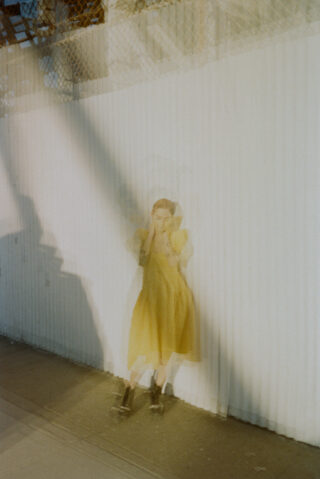
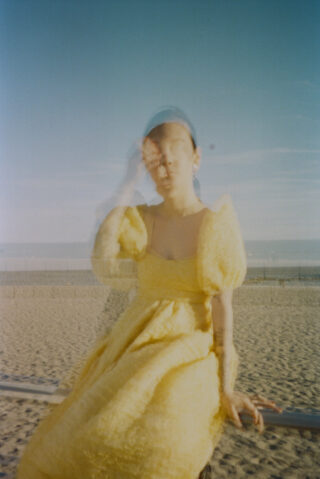
We’re back at love and connection again. These recurring themes in her work have taken on new energy in Jubliee, made possible by moving away from the “insular processes” that came out of creating her first two albums through grief. For Soft Sounds, she says, the process was almost completely isolated, with only close friend and producer Chris Hendricks trusted to work alongside her. Coming out of her grief, she began to long for a more connected creative experience. “[Jubilee] was one of more collaborative albums I’ve worked on,” she says. In fact, even before she had started work on the album proper, she felt the itch to work with musicians and artists outside her close circle. Reaching out to management, she wondered whether she might like writing for other people, “And so my publishing company set me up on like, blind dates with some gross producers and it was really unsatisfying, and I hated it so much. Similar to a corporate job, I was like, ‘Oh I could like writing for a pop star,’ and you know, it just wasn’t for me.”
Her publishing company didn’t give up as easily as her former corporate employers, though. “[They] do this thing where they lie to two people. So they paired me up with Jack Tatum from Wild Nothing, and they told Jack, ‘Oh, Michelle’s working on a new record’ – which was not true – ‘and she really wants you to write songs for it.’ And he was like, ‘Ok great I can help her’. And then to me they were like, ‘Oh Jack’s writing a new Wild Nothing album, and he really wants you to help write songs for his record’ – which he wasn’t. So, I was like, ‘Ok great, I’ll help him. Right.’ So, when we got there it was like, we were both: ‘Ok we’re writing songs for your new record,’ and then, ‘No I’m not working on a new record.’”
Clearly, the publishing company knew what they were doing, or maybe it was luck, because the Tatum collaboration resulted in ‘Be Sweet’, Jubilee’s poppy lead single. “I really loved that collaboration, and I was like, ‘I think I want this actually.’ And that was a long time ago, before I was even working on any record really, and so I had this back-pocket single that I was sitting on for a really long time, and we got together again in 2019 to kind of put polish on it.”
Collaborations with Alex G, Molly Germer and others followed, lending an outward quality to the album that marks an evolution from Zauner’s past releases. Jubilee speaks to the ways connection and being with others facilitate our access to those deeper sensations – the ones that we are robbed of through the pain of grief. “For me the record is very much about joy, but it’s also about feeling, since my last record was about, like, finding a way to avoid feeling because grief is such an intense feeling, and sorrow is an intense feeling that you don’t want to really revel in. I think a lot of Soft Sounds is about how I needed to disassociate from feeling, and now that I’ve healed in a lot of ways and went through that and time has passed I feel very ready to embrace feeling.
“And I also think as you get older your feelings naturally soften, and I think that I am the type of person that likes to feel. I am a very extreme person. You know, sometimes I’m very relieved that I don’t have the same kind of feelings I had when I was a teenager and just felt everything so much – like, comically so much. Like someone you crushed on for a week was just devastating if they didn’t reciprocate those feelings, like at that time it was just the world. And I think so much of art is those kind of feelings. As you get older you don’t have those feelings as much, and you start yearning for them in some ways or you have to recreate them in some way. So, I think part of the record is trying to chase after, or recreate, that pure of heart, total feeling. Like the song ‘Kokomo’, I wrote about 18-year-olds in love, what that feels like. And for ‘Paprika’ it was really kind of trying to remind myself how fantastic my job is. And how beautiful and incredible it is to get to linger in tones and words. That is my job you know? And sometimes when the days are long, and you know you’re just so wrapped up in busy, petty stuff, you forget how lucky you are to be in the world.”